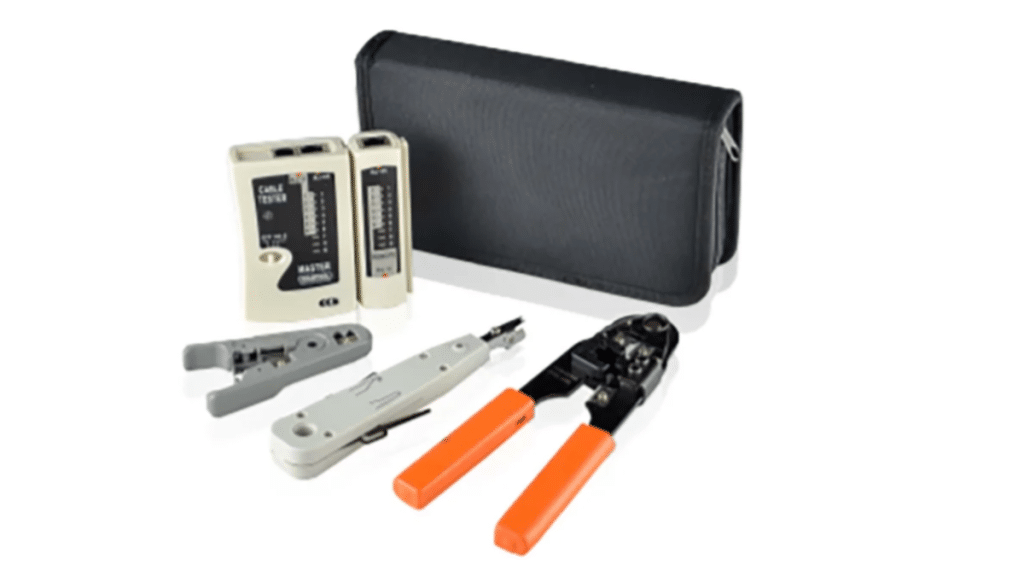When setting up any tech system—whether it’s in your home, office, or a commercial setting—cables are the hidden heroes holding everything together. From delivering internet to powering devices and transferring data, cables are a crucial part of the infrastructure. But with so many types available, knowing which cable does what, and how to test them, can save you time, money, and a lot of frustration.
This beginner-friendly guide covers the common cable types you’ll encounter and the essential tools you need to test them effectively—because when something goes wrong, being able to diagnose it quickly is a game changer.
Common Cable Types You Should Know
Let’s start with the basics: not all cables are created equal. Understanding what each one is used for can help you make the right decision when setting up or maintaining a network, entertainment system, or workspace.
1. Ethernet Cables (Cat5e, Cat6, Cat7)
Ethernet cables are widely used for network connections. You’ll find them linking computers, routers, and switches. The difference between them mainly lies in their speed and shielding.
- Cat5e: Standard for most residential setups.
- Cat6: Supports faster speeds and better shielding for interference.
- Cat7: High-end, suitable for data centers and commercial networks.
Ethernet cables are essential for stable internet connections, especially in environments where Wi-Fi isn’t reliable.
2. Coaxial Cables
You’ve probably seen coaxial cables used for cable TV and broadband internet. They have a thick outer insulation and a central metal conductor, which makes them ideal for carrying signals over long distances with minimal loss.
3. HDMI Cables
High-Definition Multimedia Interface (HDMI) cables are used to transmit video and audio between devices like TVs, computers, and gaming consoles. They’ve become the go-to choice for home entertainment systems.
4. USB Cables
USB (Universal Serial Bus) cables are the all-purpose connectors in modern electronics. Whether it’s a keyboard, printer, or phone charger, USB cables—especially newer versions like USB-C—keep devices powered and connected.
5. Power Cables
These cables deliver electricity to your devices. They come in various shapes and sizes depending on the appliance and voltage requirements. Knowing the right one helps prevent electrical hazards.
Why Testing Your Cables Matters
Cables, like any other hardware, can wear out or fail over time. Loose connections, internal breaks, or interference can all affect performance. That’s where cable testing tools come into play. They allow you to identify problems before they become major issues.
For beginners and seasoned pros alike, having the right testing tools in your toolbox is a smart move.
Essential Cable Testing Tools
1. Ethernet Cable Tester
If you work with networking setups or just want to make sure your internet isn’t lagging because of a bad cable, an ethernet cable tester is your best friend. These testers are simple to use and incredibly effective. You just plug each end of the cable into the tester, and it checks for faults like open circuits, shorts, crossed wires, or miswiring.
They’re especially useful for longer runs of cable hidden behind walls or under flooring. Investing in one can save hours of troubleshooting when your internet connection goes down.
2. Multimeter
A multimeter is a versatile electrical testing tool that can measure voltage, current, and resistance. It’s great for testing power cables, USB lines, and even identifying faulty connectors. If you’re unsure whether a cable is conducting power or not, a quick test with a multimeter can give you the answer.
3. Coaxial Cable Tester
Used specifically to test signal integrity and continuity in coaxial cables, this tool is important for checking your cable TV or internet lines. It can identify whether the cable is functioning properly and transmitting signal effectively.
4. Cable Toner and Probe Kit
A toner and probe kit is useful when trying to trace a cable through a wall or ceiling. The toner sends a signal down the wire, and the probe allows you to detect that signal along the cable’s path. Ideal for larger installs and renovations, it saves time by helping you avoid pulling the wrong cable.
Tips for Working with and Testing Cables
If you’re new to handling cables and testing tools, here are a few tips to keep in mind:
- Label your cables. This makes future troubleshooting much easier.
- Keep cable lengths appropriate. Excessively long cables can cause signal degradation.
- Test before you install. Always check that your cables work before running them through walls or ceilings.
- Store cables properly. Coiling them neatly and avoiding sharp bends will extend their life.
- Use quality tools. Cheap testers may give inaccurate results or break easily. It’s worth investing in tools that last.
When to Replace a Cable
Not all cable issues can be fixed. Here are signs it’s time for a replacement:
- Visible damage like fraying or cuts
- Intermittent connectivity
- Unexplained device malfunctions
- Failed results from a cable tester
If a cable fails your test, it’s generally safer and more efficient to replace it than to try to repair it—especially for critical connections like internet or power.
Final Thoughts
Cables are the unsung heroes of modern technology. From streaming movies to transferring files at work, they play a key role in keeping everything running smoothly. Understanding the types of cables and how to test them ensures you can troubleshoot problems quickly and keep your systems functioning at their best.
Whether you’re setting up a home network, building a gaming rig, or running a small business, tools like an ethernet cable tester and a good multimeter will help you keep things efficient and error-free.
Start building your cable-testing kit today—you’ll thank yourself the next time your Wi-Fi goes down or your monitor flickers unexpectedly.
